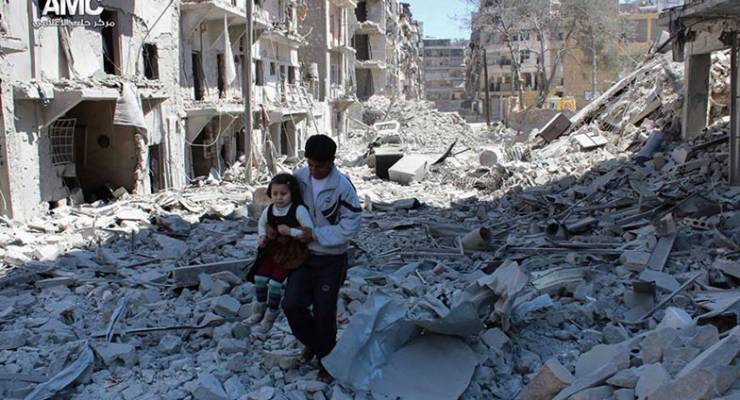
Australia’s decision to temporarily halt military flights over Syria as part of the US “collective defence” of Iraq illustrates how Russia and its proxy ally Syria are becoming twitchy about how the Syrian civil war is playing out. The battle for Raqqa — Islamic State’s headquarters — is entering its final phase, with the Kurdish People’s Protection Forces (YPG) and Free Syrian Army (FSA) closing in on remaining IS fighters in the city.
Across the border in Mosul, a similar scene is playing out, as Iraqi Armed Forces and the Kurdish Peshmerga close in on some hundreds of increasingly beleaguered IS fighters holed up in an ever smaller section of the old city. The battle for Mosul is expected to be Iraq’s last major set-piece battle against IS and will further stamp the authority of the Peshmerga on Iraq’s Kurdish north.
Set against a likely victory in Mosul, the Kurdistan regional government has announced it will hold a ballot on independence on September 24. That ballot is expected to vote overwhelmingly in favor of establishing a new, independent Kurdistan.
Back in northern Syria, the Assad regime in Damascus is watching with dismay as the FSA and YPG, supported by around 500 US special forces, secure the northern city, with Syrian forces also watching on from a helpless distance. Raqqa is deep inside rebelheld territory, to the north controlled by the FSA and to the south by IS.
Knowing that the FSA and YPG are closing in on Raqqa and, hence, about to establish their own new headquarters, two days ago the Syrian regime sent an ageing Sukhoi SU 22 fighter bomber to strike at FSA positions. In an act of “collective defence”, a US F/A18 shot down the SU22, killing its pilot.
Russia has since announced that it will track foreign aircraft in Syrian airspace, with those in western Syria becoming “targets”, hence Australia stepping away from that air theatre until that issues is resolved.
The almost inevitable fall of Raqqa and Mosul will put the north of Iraq and Syria under Kurdish control, linked across the two countries’ insubstantial border. Despite its own losses, the long fractured Kurdish territory is looking to be the winner in all this, with its forces the most competent of any in the region and its hold on territory the strongest.
The FSA will be left to carve out ground further south and east in the country. While Russia remains Syria’s key backer, the Assad regime is unlikely to fall to the FSA, but its earlier gains after Russia entered the war have since slowed.
While Syria is looking to be heading towards a longer-term stalemate, Iraq’s government is solidifying its control on all but the Kurdish north. The Kurdish state that is emerging there is making neighboring Turkey nervous, given Turkey’s own restive Kurdish population.
Kurdish control to the south of much of Turkey’s border also runs counter to Turkish leader Recep Tayyip Erdogan’s desire to expand Turkish influence in the Middle East. The latest manifestation Turkey’s intended regional influence is its alliance with and sending troops to Qatar.
This posits a Turkish-Qatari alliance in opposition to Saudi Arabia and Egypt over such issues as support for the Muslim Brotherhood, Hamas, warring factions in the Yemeni civil war and, not least, groups fighting in Syria.
With Iran supporting Syria’s Assad regime, Hezbollah and seeking to influence Iraq’s Shia Muslim majority, the Middle East is now divided between three local powers fighting proxy wars. The outcome of this three-cornered contest is likely to be a realignment of functional boundaries reflecting such influence.
While the Kurdish autonomous region remains as part of Iraq, and presumably Syria, Turkey will remain reluctant to directly invade. But should an independent Kurdistan come into being, a direct military intervention is much more likely.
Apart from the continuing horrific implications for civilians on the ground and the diminution of former state borders, all of this leaves the United States in a decidedly awkward position in the Middle East. The US’ alliances with Turkey, via NATO, Saudi Arabia, Qatar and Iraq, and its support for the FSA and YPG, are already unstable.
It will take very little from here to see US interests in the region caught up in, and subsumed by, a three-sided fight for regional supremacy. That contest will be significantly more complex and wider in scope than wars that have already torn apart much of the Middle East, in which the US and its external allies, including Australia, appear to have an open-ended commitment.
* Damien Kingsbury is professor of international politics at Deakin University








Astounding really how ignorant Westerners have been about Middle Eastern affairs since the British did such a great job of dividing it up along their concept of how it would best work for the West.
Still waiting for Howard, Blair and Bush to be jailed/vilified for their cosy little coalition of the idiots which dragged us into the whole fiasco.
The Kurds seem to have the most efficient organisational structure in that part of the world in fact there should be an independent Kurdistan -made up of the small part of Syria, Turkey and Iraq. This would make for stability in the region – also would relieve Turkey of its Kurdish independence insurgency .
The Turks are a worry under the dictatorship of the present incumbent who has undone the work of Kemal Attaturk. They now complete the circle of dictatorship in the middle East – there are no democracies left – the Kurds and Kurdistan would be come the new hope for the region.
I guess the ink must be running out on the telex from Langley VA as there is no explanation or evidence of what the US expects Turkey to do when the Kurds link across the Euphrates and consolidate into a single ethnic bloc.
Play nice?